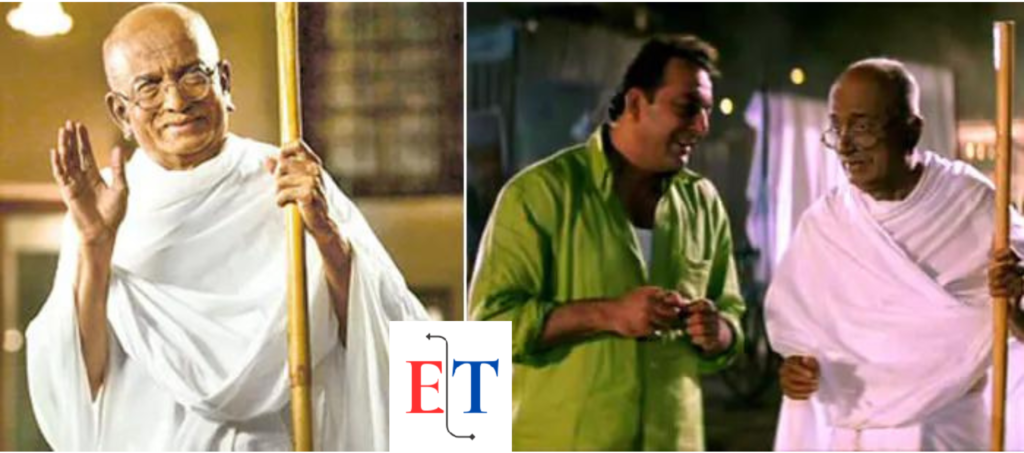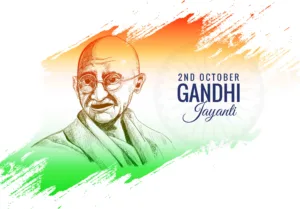
Mahatma Gandhi, the revered leader of India’s independence movement and one of the most influential figures in history, is known for his nonviolent resistance and teachings of truth and peace. His ideologies have left an indelible mark on the world, not only in politics and civil rights but also in the world of cinema.

Gandhi In Western Cinema:-
One of the earliest cinematic portrayals of Gandhi came in the form of a documentary titled “Mahatma Gandhi: 20th Century Prophet” by filmmaker John Heyer in 1949. This documentary, released just a year after Gandhi’s assassination, aimed to commemorate his life and spread his message of truth and nonviolence. It served as a powerful tribute and contributed to the popularization of Gandhi’s ideals around the world.
In 1982, Sir Richard Attenborough’s magnum opus “Gandhi” further solidified the relationship between Mahatma Gandhi and cinema. Starring Ben Kingsley in the titular role, the film depicted the life of Gandhi from his early struggles in South Africa to his triumphant fight for India’s independence. “Gandhi” became a global sensation, winning eight Academy Awards and introducing Gandhi’s philosophy to a newer and wider audience. It captured the essence of his teachings, showcasing his unwavering commitment to nonviolence and civil disobedience.
Gandhi In Indian Cinema:-
Indian cinema, too, has made several notable contributions to showcasing Gandhi’s life and values. The film “Lage Raho Munna Bhai” (2006), directed by Rajkumar Hirani, “Lage Raho Munna Bhai” is a Bollywood comedy-drama film that carries forward the legacy of Mahatma Gandhi’s principles of truth and non-violence.
The film revolves around the character of Munna Bhai (played by Sanjay Dutt), a gangster who undergoes a transformation after encountering the spirit of Mahatma Gandhi, whom he lovingly refers to as “Gandhigiri.” Munna Bhai starts practicing Gandhian principles in his life, which leads to amusing and heartwarming situations.
“Lage Raho Munna Bhai” not only explores Gandhi’s philosophy but also criticizes the prevailing social issues of corruption and hypocrisy. The film highlights the power of Gandhian principles in transforming individuals and society. It portrays the idea that change can be brought about by embracing truth, non-violence, and compassion.
The film received critical acclaim for its engaging narrative and performances. It was also a commercial success, winning several awards, including the National Film Award for Best Popular Film Providing Wholesome Entertainment. Additionally, it garnered international recognition and was screened at various film festivals worldwide, spreading Gandhi’s ideals across borders.
“Lage Raho Munna Bhai” is considered a significant film in Indian cinema for its unique blend of entertainment and social messaging. It effectively brings Gandhi’s teachings to the mainstream audience, making them relatable and relevant in the contemporary context.
Overall, “Lage Raho Munna Bhai” stands as a testament to the enduring impact of Mahatma Gandhi on Indian cinema. It showcases his ideals and encourages viewers to adopt his principles of truth, non-violence, and love for humanity.

Some Films On Gandhi:-
- Gandhi (1982)
- The Making of the Mahatma (1996)
- The Legend of Bhagat Singh (2002)
- Lage Raho Munna Bhai (2006)
- Gandhi, My Father (2007)
- Mahatma: Life of Gandhi 1869-1948 (2009)
- The Gandhi Murder (2019)
- Viceroy’s House (2017)
- Hey Ram (2000)
- Mohandas (2009)
- Sardar (1993)
- Nine Hours to Rama (1963)
- Welcome Back Gandhi (2014)
- An Autobiography of a Mahatma (1996)
- Harilal Gandhi, A Son’s Story (2002)
“Seven Social Sins” of Mahatma Gandhi:-
Mahatma Gandhi developed a set of principles that guided his actions and philosophy. These principles are often referred to as his “Seven Deadly Sins” or the “Seven Social Sins”. They are:
- Wealth without work: Gandhi believed that acquiring wealth without contributing to society through work or productive activities was a sin.
- Pleasure without conscience: Enjoying personal pleasures without considering the impact on others or without having a sense of moral responsibility was seen as a sin by Gandhi.
- Knowledge without character: Gandhi believed that knowledge alone is not enough and that it must be accompanied by good character and moral values.
- Commerce without morality: Conducting business or engaging in commercial activities without ethical considerations and moral values was considered a sin by Gandhi.
- Science without humanity: Gandhi emphasized the importance of using scientific advancements and knowledge for the betterment of humanity and not for destructive purposes.
- Religion without sacrifice: Gandhi believed that true religious practice should involve self-sacrifice and service to others, rather than simply following rituals or doctrines.
- Politics without principles: Gandhi believed that political leaders and activists should have a strong moral foundation and adhere to ethical principles in their actions and decision-making.
Interesting About ” Mahatma Gandhi”:-

- Nonviolence: Gandhi is famously known for his philosophy of nonviolence, which he termed Satyagraha. He believed in fighting injustice through peaceful means and nonviolent resistance. This approach inspired many civil rights movements across the world, including Martin Luther King Jr.’s fight for equality in the United States.
- Simplicity and Simplicity: Gandhi lived a simple and frugal lifestyle, wearing only a simple loincloth. He believed in living a life of self-discipline and self-reliance. His minimalist approach to living was intended to demonstrate that material possessions were not the source of true happiness.
- Spinning Wheel: Gandhi promoted the use of the spinning wheel or charkha as a symbol of self-sufficiency and economic independence. He encouraged Indians to spin their own cotton thread and weave their own cloth to break away from dependence on British textiles. This act fostered a sense of national pride and unity.
- Vegetarianism: Gandhi was a strong advocate of vegetarianism and believed in the principle of ahimsa (non-violence toward all living beings). He said, “The greatness of a country and its ethical development may be judged via way of means of the manner its animals are treated.”
- Education: Gandhi emphasized the importance of education in empowering individuals and societies. He believed in providing education that focused on character-building, skill development, and promoting social welfare. He established schools and educational institutions throughout his life with the aim of educating the masses.
Although Gandhi himself never acted in any films, his life and teachings have been a source of inspiration for numerous filmmakers, both in India and the international film community. From documentaries to biographical dramas, movies have played a significant role in bringing his story to the masses and reminding us of his profound impact on humanity
Credit Video Link : YouTube